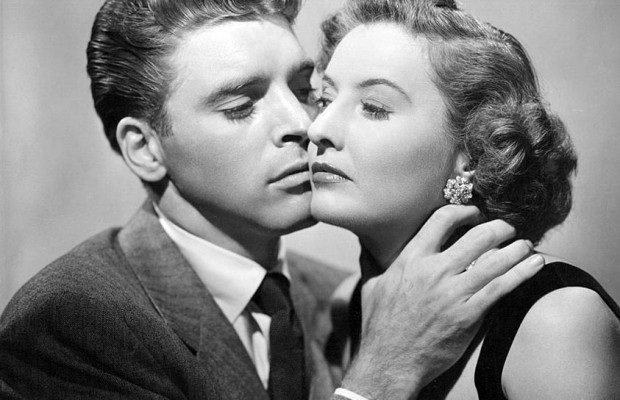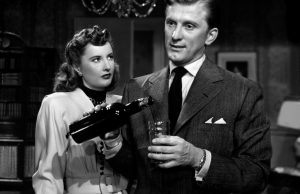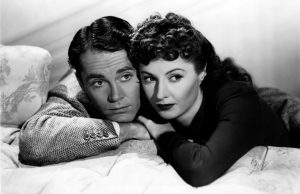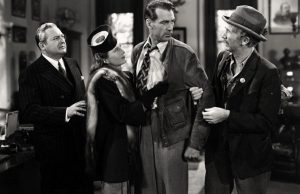Sorry, Wrong Number (1948)
By Toronto Film Society on January 8, 2014
Toronto Film Society presented Sorry, Wrong Number on Friday, May 11, 2012 as part of Season 65 May Festival: The Dead Men Don’t Wear Plaid Weekend.
“Sorry, Wrong Number” is a real chiller. Based on the w.k. radio drama of same title, picture is a top entry for the horror field. It should rate a handsome boxoffice return. The basic suspense of the ether show has been enlarged for sight values in the filming, and payoff reaps a load of spine-tingling menace.
Film is a fancily dressed co-production by Hal B. Wallis and Anatole Litvak. Pair has smoothly coordinated efforts to give strong backing to the Lucille Fletcher script, based on her  radio play. Litvak’s direction builds carefully, constantly heightening the tension to the nerve-wracking finale. It’s an ace job of story guidance and player handling.
radio play. Litvak’s direction builds carefully, constantly heightening the tension to the nerve-wracking finale. It’s an ace job of story guidance and player handling.
Plot familiar to most radio listeners, deals with an invalid femme who overhears a murder scheme through crossed telephone lines. Alone in her home, the invalid tries to trace the call. She fails, and then tries to convince the police of the danger. She gradually comes to realize that it is her own death that is planned and tension mounts to the ruthless, deadly scene where the murderer does his job.
Characters have been more roundly developed for filming because of the screen’s greater flexibility and players realize perfectly on their assignments. What makes the characters tick is built up through flashbacks that detail motives and sharpen more suspenseful moments.
Barbara Stanwyck plays her role of the invalid almost entirely in bed. Her reading is sock, the actress giving an interpretation that makes the neurotic, selfish woman understandable. Same touch is used by Burt Lancaster to make audiences see through the role of the invalid’s husband and how he came to plot her death. Both are very able.
Contributing capable performances are among others, Ann Richards, who gives Miss Stanwyck her first inkling of the truth; Wendell Corey, physician; Harold Vermilyea, chemist; Ed  Begley, the invalid’s father; Leif Erickson and William Conrad. Some are seen only in bits and lend validity to the story.
Begley, the invalid’s father; Leif Erickson and William Conrad. Some are seen only in bits and lend validity to the story.
Considerable emphasis is laced on the score by Franz Waxman, music being used to heighten and highlight the gradually mounting suspense. Sol Polito uses an extremely mobile camera for the same effect sharpening the building terror with unusual angles and lighting. Warren Low’s capable editing holds the picture to a tight 89 minutes.
VARIETY, Brog., June 28, 1948
SORRY, WRONG NUMBER, screen play by Lucille Fletcher, based on her radio drama of the same title; directed by Anatole Litvak and produced by r. Litvak and Hal Wallis for Paramount. At the Paramount Theatre.
The moral of “Sorry, Wrong Number,” which came to the Paramount yesterday, is that you should never leave a woman alone in a house with a telephone, especially if the woman is a nervous, excitable type. For, according to this demonstration, she can drive herself stark staring mad by an excessive utilization of that innocent little machine. And the impulse to reckless telephoning may be just too hard to overcome—especially if one gets the notion that one’s husband has an urge to do one in.
Hand it to Lucille Fletcher, who wrote this picture’s script from her own popular radio drama, played many times, we are told: she has certainly conceived an unusual device for unfolding a plot. For she’s fixed it so Barbara Stanwyck, as a selfish, suspicious dame, lying alone on the top floor of a fancy town-house in Sutton Place, can glean for herself all the details, plus the background, of a complicated plan to bring about her own destruction—without once going out of the room.
The gimmick, of course, is the telephone, which has long been the playwright’s best friend—but never, to our recollection, as exploited a one as it is here. From the moment that  languishing Miss Stanwyck happens to get a crossed wire trying to call her husband and hears a murder being planned, she keeps the wires hot and busy, anxiously pleading for aid. Then her cold fear increases as more startling revelations reach her ears, exposed to the eavesdropping audience in illustrative flashbacks and such. And finally her terror is titanic—and she has run up some telephone bill—when she has got the conclusive information that she is going to be bumped off.
languishing Miss Stanwyck happens to get a crossed wire trying to call her husband and hears a murder being planned, she keeps the wires hot and busy, anxiously pleading for aid. Then her cold fear increases as more startling revelations reach her ears, exposed to the eavesdropping audience in illustrative flashbacks and such. And finally her terror is titanic—and she has run up some telephone bill—when she has got the conclusive information that she is going to be bumped off.
As a sheer exercise in melodrama and in cumulative suspense, this film has some highly vivid episodes and a grimly exciting final reel. Anatole Litvak, the director, has whipped it up hotly toward the end. And it also has some rather novel implications of a neurotic twist, this one involving the complex of a father-daughter relationship. But the narrative structure of the story and the involuted way in which it is told, with flashbacks occurring within flashbacks and extraneities popping here and there, cause it to be quite bewildering and therefore tedious in the lengthy middle phase.
Also the fact that coincidence plays almost as big a part in the story as does Miss Stanwyck weakens its credibility. Not only is it unlikely that a lady could learn so much from so many  random people in such a short space of time, but it somehow seems just a bit far-fetched that the telephone company would oblige with so many technical mix-ups and exceptions just to forward a plot. An expert in phone communications has just reported to us that the representations of “hello girls” are “atrocious” and “insulting,” too.
random people in such a short space of time, but it somehow seems just a bit far-fetched that the telephone company would oblige with so many technical mix-ups and exceptions just to forward a plot. An expert in phone communications has just reported to us that the representations of “hello girls” are “atrocious” and “insulting,” too.
As the ear-bending lady, however, Miss Stanwyck does a quite elaborate job of working herself into a frenzy, as well as playing a nasty dame in the previous and self-aggrandizing phases of her life. And a painfully obtuse performance as her stubborn and frustrated spouse who is driven to criminal extremities is given by Burt Lancaster. Ed Begley is uncouth as her father, Ann Richards is prim as a school friend and Harold Vermilyea, Wendell Corey and William Conrad are intriguing in lesser roles.
Perhaps if you have a special interest in foul folks and morbidities, you will thrill to this Hal Wallis picture. Frankly, we squirmed—and not from dread.
NEW YORK TIMES, by Bosley Crowther, May 26, 1945
Notes compiled by Caren Feldman
You may also like...
-
News

Frances Blau
Toronto Film Society | February 27, 2024On Monday, February 26th, 2024, Toronto Film Society lost longtime friend, supporter, and board member Frances Blau. Known for her sense of humour, her love of film, her generosity,...
-
Special Events

Arsenic and Old Lace (1944) at the Paradise Theatre
Toronto Film Society | April 21, 2024Toronto Film Society presents Arsenic and Old Lace (1944) at the Paradise Theatre on Sunday, May 5, 2024 at 2:30 p.m. Screwball comedy meets the macabre in one of...
Programming

Virtual Saturday Night at the Movies
Toronto Film Society | April 11, 2024Toronto Film Society is back in the theatre! However, we’re still pleased to continue to bring you films straight to your home! Beginning Season 73 until now we have...
4-
 Toronto Film Society | April 21, 2024
Toronto Film Society | April 21, 2024
-
 Toronto Film Society | November 6, 2022
Toronto Film Society | November 6, 2022
-
 Toronto Film Society | August 1, 2023
Toronto Film Society | August 1, 2023
Donate to Toronto Film Society – We’re now a Registered Charity!
-
Copyright © 2017 Toronto Film Society.




Leave a Reply